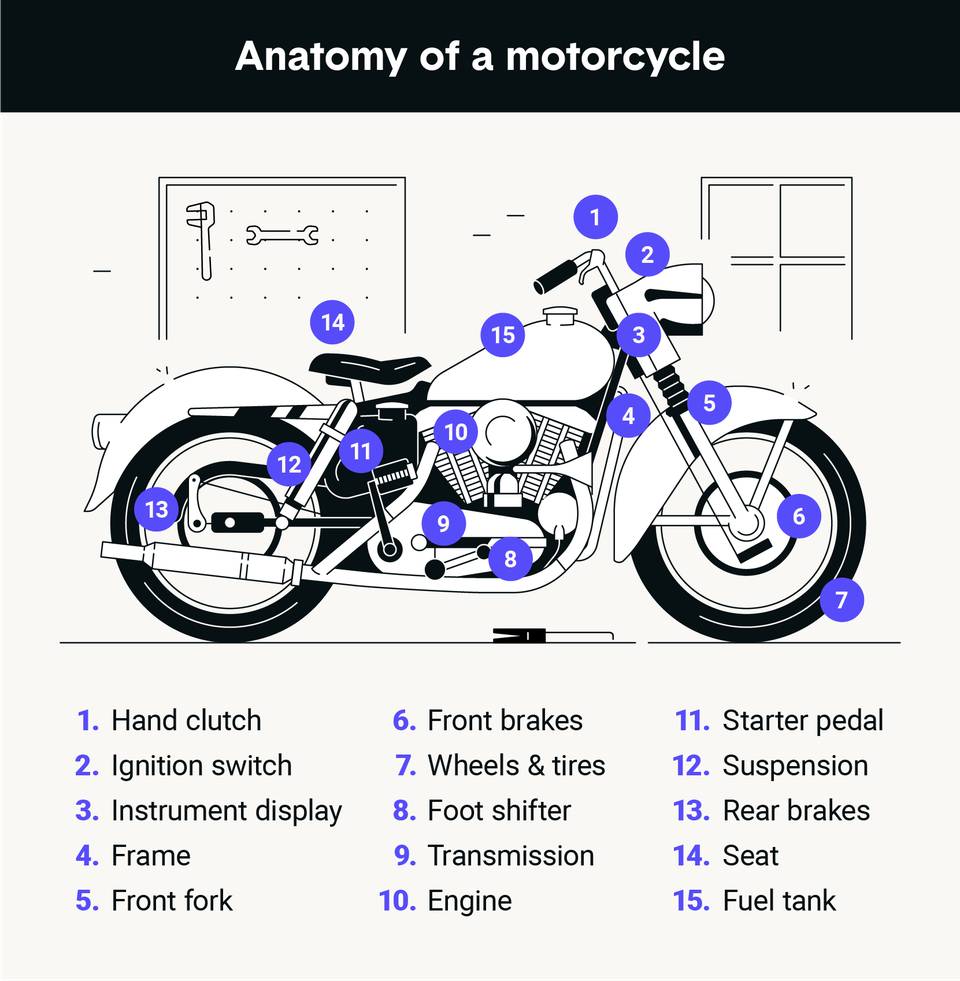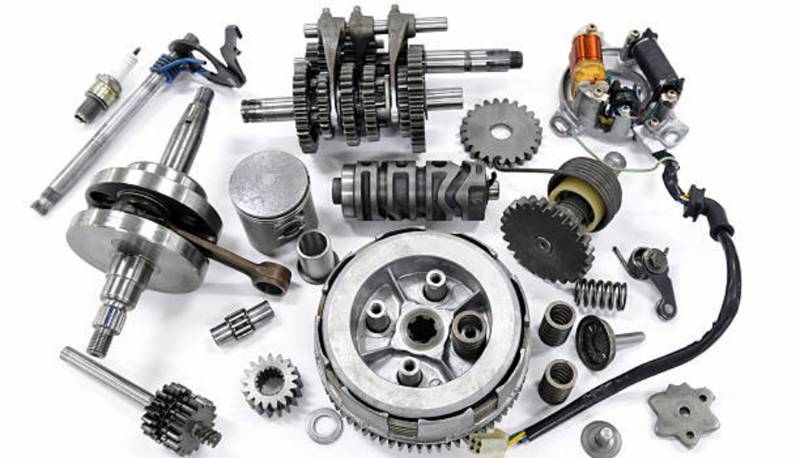The Best Tools to Keep Your Motorcycle Spares Christchurch in Working Order
The Best Tools to Keep Your Motorcycle Spares Christchurch in Working Order
Blog Article
Discover the Essential MotorBike Components You Need for Optimum Performance
Comprehending the important components of a motorcycle is essential for attaining peak efficiency. Each element, from the engine to the stopping system, plays a crucial function in total functionality and safety. Normal upkeep can prevent unforeseen failings and enhance the riding experience. Numerous motorcyclists overlook the intricacies of these systems. Discovering just how they interact can result in a more reliable ride. What essential elements should every cyclist focus on?
The Engine: The Heart of Your Bike
The engine offers as the core element of a motorbike, driving its efficiency and specifying its capacities. It is liable for converting fuel into mechanical power, which powers the bike onward. Various types of engines are used, consisting of single-cylinder, V-twin, and inline configurations, each offering unique features fit for different riding styles and objectives. The engine dimension, commonly gauged in cubic centimeters (cc), substantially influences performance, with bigger engines normally providing even more power and torque.Furthermore, the engine's design and modern technology, such as fuel injection systems or air-cooling versus liquid-cooling, affect performance and reliability. Upkeep is essential for peak operation; variables like normal oil modifications and monitoring trigger connects guarantee durability. Riders commonly think about an engine's responsiveness and smoothness, as these characteristics enhance the overall riding experience. Eventually, the engine stays a critical element that defines not only the motorcycle's efficiency but also the cyclist's link to the machine.
The Transmission: Shifting Gears Smoothly
The transmission plays a crucial role in a motorcycle's efficiency, particularly in the auto mechanics of equipment changing. Understanding just how to move equipments smoothly can boost the general riding experience, while regular maintenance warranties peak performance. Correct interest to these aspects can considerably affect the long life and performance of the bike.

Gear Shifting Mechanics
Smooth equipment shifting is essential for excellent motorbike performance, greatly influencing both acceleration and control. The mechanics of equipment moving entail the interaction between the clutch, equipment lever, and transmission system. When a motorcyclist involves the clutch, it disengages the engine from the transmission, permitting an equipment change without damaging the elements. A well-timed release of the clutch, integrated with exact movement of the equipment bar, promotes a seamless modification in between equipments. This procedure assures that the engine operates within its ideal power band, boosting performance. Motorcycle Parts Auckland. Furthermore, recognizing the equipment proportions and their effect on speed and torque can assist cyclists make informed choices during changes, inevitably adding to an extra pleasurable and receptive riding experience
Upkeep Tips Relevance
Routine upkeep plays a vital duty in assuring that the transmission system runs effectively, enabling smooth equipment shifts. On a regular basis examining and transforming the transmission liquid is crucial, as old liquid can cause boosted rubbing and wear. Furthermore, checking the clutch for wear guarantees peak involvement and disengagement, stopping slippage throughout equipment adjustments. Lubrication of moving parts is equally important to reduce friction and boost efficiency. Bike owners ought to also keep track of for leaks and uncommon noises, as these can suggest underlying concerns. By sticking to these maintenance suggestions, motorcyclists can extend the life expectancy of their transmission system, ensuring that equipment changes stay seamless and contributing to the general performance of their motorcycle.
The Braking System: Ensuring Security on Every Trip
Braking systems are basic components that directly affect a motorbike's safety and security and efficiency. They consist of numerous components, including brake pads, blades, calipers, and hydraulic lines, all interacting to assure efficient deceleration. The sort of stopping system-- commonly either disc or drum-- impacts responsiveness and quiting power.Regular maintenance is important to promote peak performance; worn brake pads can bring about decreased efficiency and enhanced quiting distances. Additionally, the quality of brake liquid should be checked, as it can take in dampness gradually, endangering stopping efficiency.Riders should also take into consideration the importance of anti-lock stopping systems (ABDOMINAL MUSCLE), which avoid wheel lockup throughout abrupt quits, boosting overall safety and security. Appropriately functioning brakes are not almost quiting; they infuse confidence in the biker, allowing for safer navigation via different surfaces. Inevitably, a trustworthy braking system is critical for delighting in every experience with assurance.
The Suspension: Enhancing Convenience and Control
A well-functioning suspension system considerably adds to a motorcycle's general efficiency, enhancing the effectiveness of the stopping system. The suspension plays a substantial role in absorbing shocks from irregular surfaces, ensuring a smoother trip while maintaining tire call with the roadway. This call is necessary for both security and control, permitting motorcyclists to browse edges with self-confidence and precision.Different types of shock absorber, such as telescopic forks or mono-shocks, supply differing levels of comfort and handling. Properly tuned suspension boosts responsiveness, offering the biker with a more linked feeling to the motorcycle. Regular maintenance checks are necessary to ascertain the suspension parts, consisting of dampers and springs, are functioning at their ideal. An efficient shock absorber not only elevates the riding experience however likewise contributes to the long life of other motorcycle components by reducing wear and tear. Therefore, purchasing quality suspension is vital for any type of serious motorbike fanatic.
The Tires: Connecting You to the Roadway
Tires play a vital function in a motorcycle's performance, serving as the key web link between the motorcyclist and the road. Comprehending the various kinds of tires available can significantly site web impact managing and safety and security. In addition, routine maintenance is important to guarantee peak tire performance and long life.
Tire Types Explained
Just how do different tire types influence a motorcycle's efficiency? Tire types play an important duty in determining a motorbike's hold, security, and handling. Sport tires, created for high performance, deal boosted traction and responsiveness on paved roadways, making them optimal for competing and hostile riding. On the other hand, visiting tires focus on sturdiness and convenience, giving a smoother trip for long-distance travel. Off-road tires, defined by their sturdy step patterns, excel in grip on unpaved surface areas, appropriate for adventure lovers. Furthermore, dual-sport tires blend features from both off-road and on-road categories, accommodating functional riding requirements. Eventually, picking the appropriate tire kind is crucial for optimizing performance, making sure security, and improving the general riding experience.
Upkeep Tips Offered
While riding when traveling, maintaining excellent tire problem is vital for safety and performance. Routinely examining tire stress is essential, as under-inflated tires can lead to over at this website bad handling and enhanced wear. It is advisable to evaluate walk deepness often; worn tires compromise grasp and stability. On top of that, motorcyclists need to seek signs of damages, such as cracks or bulges, which can show the requirement for replacement. Turning tires regularly ensures also put on, improving long life. Maintaining tires tidy from particles and staying clear of too much aesthetics can prolong their lifespan. Keeping appropriate alignment and balance contributes to peak efficiency, lessening tension on other bike elements. Adhering to these upkeep tips will greatly boost the general these details riding experience.
The Gas System: Sustaining Efficiency and Performance
The fuel system plays an important role in taking full advantage of a motorbike's efficiency and efficiency, as it guarantees the optimal shipment of fuel to the engine. It comprises numerous important elements, including the fuel tank, fuel pump, gas filter, and fuel injectors or carburetor. Each part must operate effectively to assure a smooth and powerful ride.The gas storage tank shops fuel and supplies it to the engine via the fuel pump, which generates the necessary stress. A gas filter stops contaminants from going into the engine, while the injectors or carburetor mix gas with air for combustion.Proper maintenance of the fuel system is important; a blocked filter or malfunctioning injector can bring about decreased efficiency and increased fuel usage. By confirming that the gas system runs efficiently, riders can appreciate enhanced throttle response, much better gas economic climate, and generally enhanced riding experience.
The Electric System: Powering Your Adventure
An efficient electrical system is essential for the overall performance and safety of a motorcycle, as it powers vital elements such as the ignition, illumination, and various digital systems. This system includes the battery, which stores power, and the alternator, in charge of generating power while the engine runs. The electrical wiring harness attaches these parts, making certain trustworthy power distribution.Additionally, merges shield the system from overloads, while relays assist control high-current devices with low-power signals. A properly maintained electric system boosts performance by guaranteeing smooth begins and consistent operation of signals and lights, crucial for rider visibility and safety.Regular checks of the battery's cost and links are crucial for protecting against electrical failings. Motorcyclists ought to likewise check wiring for wear and tear, making certain all elements function preferably. Eventually, a durable electrical system contributes substantially to the general performance and integrity of the motorbike.
Often Asked Questions
How Often Should I Replace My Bike's Battery?
The regularity of bike battery replacement depends on usage and upkeep (Motorbike Components NZ). Typically, batteries ought to be changed every 3 to 5 years. Normal checks can assist identify when a replacement is necessary for peak performance
What Devices Do I Required for Basic Motorcycle Maintenance?
For fundamental motorcycle upkeep, one requires important devices such as an outlet set, wrenches, screwdrivers, pliers, tire stress gauge, and a torque wrench. These tools help with effective maintenance and ensure the bike runs efficiently and safely.
How Can I Improve My Motorbike's Aerodynamics?
To enhance bike aerodynamics, one ought to consider readjusting fairings, utilizing windshield expansions, maximizing body setting, and lowering total weight. These alterations assist lessen drag, boosting security and fuel efficiency throughout experiences.
What Are the Signs of a Failing Electric System?
Signs of a stopping working electrical system include lowering lights, problem beginning, irregular instrument analyses, and blown merges. Oem Parts New Zealand. Uncommon smells or rust around battery terminals might additionally indicate underlying issues needing instant focus for security and efficiency

How Do I Select the Right Oil for My Bike?
When choosing oil for a motorcycle, one must consider the supplier's requirements, viscosity ratings, and the kind of riding. Furthermore, synthetic versus conventional oil can affect performance and engine security, influencing the decision considerably. The engine dimension, typically gauged in cubic centimeters (cc), significantly affects efficiency, with bigger engines usually giving even more power and torque.Furthermore, the engine's design and modern technology, such as fuel injection systems or air-cooling versus liquid-cooling, impact efficiency and dependability. A well-functioning suspension system considerably adds to a motorcycle's total efficiency, matching the effectiveness of the stopping system. The gas system plays a crucial role in maximizing a motorbike's performance and performance, as it assures the optimum shipment of gas to the engine. A gas filter stops pollutants from going into the engine, while the injectors or carburetor mix fuel with air for combustion.Proper maintenance of the fuel system is essential; a stopped up filter or malfunctioning injector can lead to lowered performance and increased gas usage. A properly maintained electric system boosts performance by guaranteeing smooth begins and constant procedure of signals and lights, essential for rider visibility and safety.Regular checks of the battery's fee and links are vital for stopping electrical failings.
Report this page